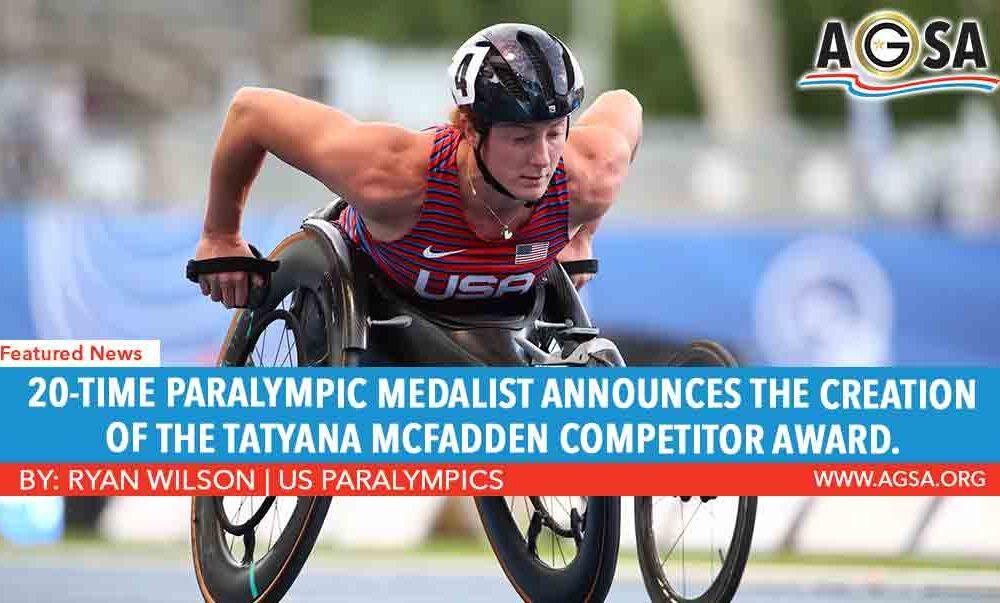
Travel Expenses Quickly Add Up For Para Athletes. Tatyana McFadden Wants To Help With That
By: Ryan Wilson | US Paralympics
Para athletes face a ton of obstacles while pursuing an athletic career.
One frequent deterrent for athletes is travel expenses, which is something Tatyana McFadden wants to help the next generation of Para athletes deal with.
That’s why the 20-time Paralympic medalist, in connection with the DICK’s Sporting Goods Foundation, has created the Tatyana McFadden Competitor Award. Recipients of the award will receive up to $500 to help cover travel expenses to any Move United-sanctioned competition (including the Hartford Nationals) taking place this year.
“It’s really just a dream come true that I can do this,” McFadden told USParaTF.org. “It’s what I want to continue doing.”
Often, the barriers of entry into wheelchair racing can be quite high. While the athletes on the national team receive a monthly stipend, younger athletes don’t receive any financial assistance and are responsible for covering the cost of traveling to races. That alone can cost upwards of four figures when factoring in hotels, food, transportation and other costs.
Many athletes raise funds on their own through online resources. Some get help from nonprofit organizations.
McFadden, now 34 and training for her seventh Paralympic Games this summer in Paris, got her start more than two decades ago with the help of donations from Bennett Blazers, an adaptive sports program run through the Kennedy Krieger Institute in her hometown of Baltimore. On top of providing specialized coaching, the program helped McFadden pay for some of her early racing equipment, another major expense for any racer.
New racing wheelchairs can cost between $5,000 and $10,000. Repairing or replacing individual parts like tires, handrims or seat cushions can cost hundreds of dollars as well. McFadden said tires can cost an additional $1,000 apiece.
Bennett Blazers, similar to other adaptive sports programs, is given spare equipment through donations, and McFadden was able to capitalize on the equipment they had on hand.
In fact, she was able to practice with a chair designed by Bob Hall. Touted as the “father of wheelchair racing,” Hall was one of the first wheelchair racers in the Boston Marathon and paved the way for having wheelchair racers accepted as official participants in the event. Hall eventually went on to design his own chairs. McFadden said using one of Hall’s chairs allowed her to experiment with the design to accommodate her comfort level.
“That took off a great expense right there, because I didn’t have to keep buying racing chairs,” McFadden said.
McFadden and Daniel Romanchuk — a two-time Paralympic medalist wheelchair racer who also got his start with the help of Bennett Blazers — have donated old equipment back to their starting place in Baltimore.
Romanchuk once gave the program a $6,000 chair. Wheelchair basketball player and fellow alum of the program Ryan Neiswender, a 2020 U.S. Paralympian, helped the Blazers secure $20,000 to buy more wheelchairs.
McFadden said adaptive programs now allow new racers to try out elite equipment she did not have access to when she first started.
“It’s amazing that they can also start with carbon wheels and start with really nice things because they have been donated,” McFadden said.
The assistance McFadden received early in her career helped her become a six-time Paralympian and one of the most decorated wheelchair racers in the world. Her 20 Paralympic medals include eight golds, seven silvers and four bronzes from wheelchair racing, and one silver from the Sochi 2014 Winter Games in Nordic skiing. McFadden has also won 23 world championships medals, 16 of which are gold.
She is set to continue her high level of racing in the Paralympic Games Paris 2024 later this year, as she’s already qualified for the marathon event at the Games. McFadden kicked off her 2024 track season in mid-February at the Dubai Grand Prix, where she broke her own world record in the 400-meter T54 by 0.18 seconds.
With no signs of slowing down, McFadden also hopes to compete in the 2028 Games in Los Angeles, where she’d be 39 years old.
McFadden has already elevated the sport of wheelchair racing, and she wants to leave a lasting legacy on the next generation of athletes like herself. The Tatyana McFadden Competitor Award, she said, was another way to do that.
“It means the world to me that I can just help out a little bit,” she said. “Of course, I want to do more, but right now, it’s just a great start.”